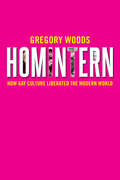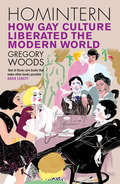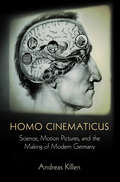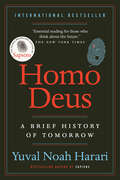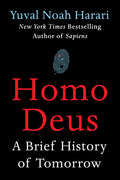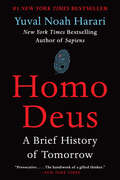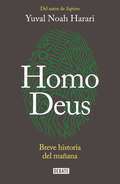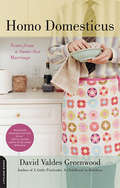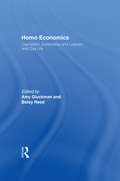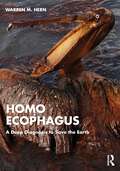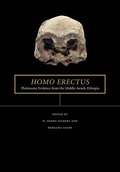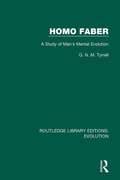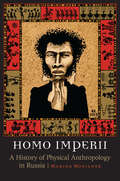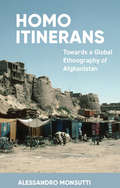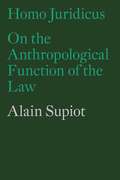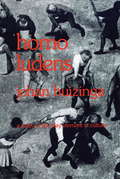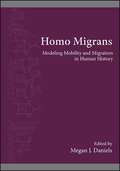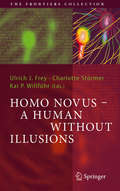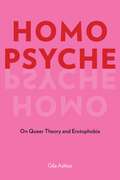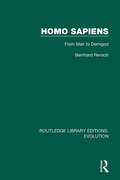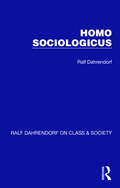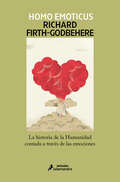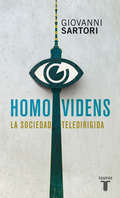- Table View
- List View
Homintern: How Gay Culture Liberated the Modern World
by Gregory WoodsIn a hugely ambitious study which crosses continents, languages, and almost a century, Gregory Woods identifies the ways in which homosexuality has helped shape Western culture. Extending from the trials of Oscar Wilde to the gay liberation era, this book examines a period in which increased visibility made acceptance of homosexuality one of the measures of modernity. Â Woods shines a revealing light on the diverse, informal networks of gay people in the arts and other creative fields. Uneasily called "the Homintern" (an echo of Lenin's "Comintern") by those suspicious of an international homosexual conspiracy, such networks connected gay writers, actors, artists, musicians, dancers, filmmakers, politicians, and spies. While providing some defense against dominant heterosexual exclusion, the grouping brought solidarity, celebrated talent, and, in doing so, invigorated the majority culture. Â Woods introduces an enormous cast of gifted and extraordinary characters, most of them operating with surprising openness; but also explores such issues as artistic influence, the coping strategies of minorities, the hypocrisies of conservatism, and the effects of positive and negative discrimination. Traveling from Harlem in the 1910s to 1920s Paris, 1930s Berlin, 1950s New York and beyond, this sharply observed, warm-spirited book presents a surpassing portrait of twentieth-century gay culture and the men and women who both redefined themselves and changed history.
Homintern: How Gay Culture Liberated the Modern World
by Gregory WoodsA landmark account of gay and lesbian creative networks and the seismic changes they brought to twentieth-century culture In a hugely ambitious study which crosses continents, languages, and almost a century, Gregory Woods identifies the ways in which homosexuality has helped shape Western culture. Extending from the trials of Oscar Wilde to the gay liberation era, this book examines a period in which increased visibility made acceptance of homosexuality one of the measures of modernity. Woods shines a revealing light on the diverse, informal networks of gay people in the arts and other creative fields. Uneasily called “the Homintern” (an echo of Lenin’s “Comintern”) by those suspicious of an international homosexual conspiracy, such networks connected gay writers, actors, artists, musicians, dancers, filmmakers, politicians, and spies. While providing some defense against dominant heterosexual exclusion, the grouping brought solidarity, celebrated talent, and, in doing so, invigorated the majority culture. Woods introduces an enormous cast of gifted and extraordinary characters, most of them operating with surprising openness; but also explores such issues as artistic influence, the coping strategies of minorities, the hypocrisies of conservatism, and the effects of positive and negative discrimination. Traveling from Harlem in the 1910s to 1920s Paris, 1930s Berlin, 1950s New York and beyond, this sharply observed, warm-spirited book presents a surpassing portrait of twentieth-century gay culture and the men and women who both redefined themselves and changed history.
Homo Cinematicus: Science, Motion Pictures, and the Making of Modern Germany
by Andreas KillenIn the early decades of the twentieth century, two intertwined changes began to shape the direction of German society. The baptism of the German film industry took place amid post-World War I conditions of political and social breakdown, and the cultural vacuum left by collapsing institutions was partially filled by moving images. At the same time, the emerging human sciences—psychiatry, neurology, sexology, eugenics, industrial psychology, and psychoanalysis—began to play an increasingly significant role in setting the terms for the way Germany analyzed itself and the problems it had inherited from its authoritarian past, the modernizing process, and war. Moreover, in advancing their professional and social goals, these sciences became heavily reliant on motion pictures.Situated at the intersection of film studies, the history of science and medicine, and the history of modern Germany, Homo Cinematicus connects the rise of cinema as a social institution to an inquiry into the history of knowledge production in the human sciences. Taking its title from a term coined in 1919 by commentator Wilhelm Stapel to identify a new social type that had been created by the emergence of cinema, Killen's book explores how a new class of experts in these new disciplines converged on the figure of the "homo cinematicus" and made him central to many of that era's major narratives and social policy initiatives.Killen traces film's use by the human sciences as a tool for producing, communicating, and popularizing new kinds of knowledge, as well as the ways that this alliance was challenged by popular films that interrogated the truth claims of both modern science and scientific cinema. In doing so, Homo Cinematicus endeavors to move beyond the divide between scientific and popular film, examining their historical coexistence and coevolution.
Homo Deus: A Brief History of Tomorrow
by Yuval Noah HarariFrom the author of the international bestseller Sapiens: A Brief History of Humankind comes an extraordinary new book that explores the future of the human species. Yuval Noah Harari, author of the bestselling Sapiens: A Brief History of Humankind, envisions a not-too-distant world in which we face a new set of challenges. In Homo Deus, he examines our future with his trademark blend of science, history, philosophy and every discipline in between. Homo Deus explores the projects, dreams and nightmares that will shape the twenty-first century - from overcoming death to creating artificial life. It asks the fundamental questions: Where do we go from here? And how will we protect this fragile world from our own destructive powers? This is the next stage of evolution. This is Homo Deus. War is obsolete You are more likely to commit suicide than be killed in conflict Famine is disappearing You are at more risk of obesity than starvation Death is just a technical problem Equality is out - but immortality is in What does our future hold?From the Hardcover edition.
Homo Deus: A Brief History of Tomorrow
by Yuval Noah HarariInternational Bestseller From the author of the international bestseller Sapiens: A Brief History of Humankind comes an extraordinary new book that explores the future of the human species. Yuval Noah Harari, author of the bestselling Sapiens: A Brief History of Humankind, envisions a not-too-distant world in which we face a new set of challenges. In Homo Deus, he examines our future with his trademark blend of science, history, philosophy and every discipline in between. Homo Deus explores the projects, dreams and nightmares that will shape the twenty-first century – from overcoming death to creating artificial life. It asks the fundamental questions: Where do we go from here? And how will we protect this fragile world from our own destructive powers? This is the next stage of evolution. This is Homo Deus. War is obsolete You are more likely to commit suicide than be killed in conflict Famine is disappearing You are at more risk of obesity than starvation Death is just a technical problem Equality is out – but immortality is in What does our future hold?
Homo Deus: A Brief History of Tomorrow
by Yuval Noah HarariOfficial U.S. edition with full color illustrations throughout.NEW YORK TIMES BESTSELLER Yuval Noah Harari, author of the critically-acclaimed New York Times bestseller and international phenomenon Sapiens, returns with an equally original, compelling, and provocative book, turning his focus toward humanity’s future, and our quest to upgrade humans into gods.Over the past century humankind has managed to do the impossible and rein in famine, plague, and war. This may seem hard to accept, but, as Harari explains in his trademark style—thorough, yet riveting—famine, plague and war have been transformed from incomprehensible and uncontrollable forces of nature into manageable challenges. For the first time ever, more people die from eating too much than from eating too little; more people die from old age than from infectious diseases; and more people commit suicide than are killed by soldiers, terrorists and criminals put together. The average American is a thousand times more likely to die from binging at McDonalds than from being blown up by Al Qaeda.What then will replace famine, plague, and war at the top of the human agenda? As the self-made gods of planet earth, what destinies will we set ourselves, and which quests will we undertake? Homo Deus explores the projects, dreams and nightmares that will shape the twenty-first century—from overcoming death to creating artificial life. It asks the fundamental questions: Where do we go from here? And how will we protect this fragile world from our own destructive powers? This is the next stage of evolution. This is Homo Deus.With the same insight and clarity that made Sapiens an international hit and a New York Times bestseller, Harari maps out our future.
Homo Deus: A Brief History of Tomorrow
by Yuval Noah HarariYuval Noah Harari, author of the critically-acclaimed New York Times bestseller and international phenomenon Sapiens, returns with an equally original, compelling, and provocative book, turning his focus toward humanity’s future, and our quest to upgrade humans into gods.Over the past century humankind has managed to do the impossible and rein in famine, plague, and war. This may seem hard to accept, but, as Harari explains in his trademark style—thorough, yet riveting—famine, plague and war have been transformed from incomprehensible and uncontrollable forces of nature into manageable challenges. For the first time ever, more people die from eating too much than from eating too little; more people die from old age than from infectious diseases; and more people commit suicide than are killed by soldiers, terrorists and criminals put together. The average American is a thousand times more likely to die from binging at McDonalds than from being blown up by Al Qaeda.What then will replace famine, plague, and war at the top of the human agenda? As the self-made gods of planet earth, what destinies will we set ourselves, and which quests will we undertake? Homo Deus explores the projects, dreams and nightmares that will shape the twenty-first century—from overcoming death to creating artificial life. It asks the fundamental questions: Where do we go from here? And how will we protect this fragile world from our own destructive powers? This is the next stage of evolution. This is Homo Deus.With the same insight and clarity that made Sapiens an international hit and a New York Times bestseller, Harari maps out our future.
Homo Deus: Breve historia del mañana
by Yuval Noah HarariTras el éxito de Sapiens. De animales a dioses, Yuval Noah Harari vuelve su mirada al futuro para ver hacia dónde nos dirigimos. La guerra es algo obsoleto. Es más probable quitarse la vida que morir en un conflicto bélico. La hambruna está desapareciendo. Es más habitual sufrir obesidad que pasar hambre. La muerte es solo un problema técnico. Adiós igualdad. Hola inmortalidad. ¿Qué nos depara el futuro? Yuval Noah Harari, autor bestseller de Sapiens. De animales a dioses, augura un mundo no tan lejano en el cual nos veremos enfrentados a una nueva serie de retos. Homo Deus explora los proyectos, los sueños y las pesadillas que irán moldeando el siglo XXI -desde superar la muerte hasta la creación de la inteligencia artificial. - Cuando tu Smartphone te conozca mejor de lo que te conoces a ti mismo, ¿seguirás escogiendo tu trabajo, a tu pareja y a tu presidente? - Cuando la inteligencia artificial nos desmarque del mercado laboral, ¿encontrarán los millones de desempleados algún tipo de significado en las drogas o los juegos virtuales? - Cuando los cuerpos y cerebros sean productos de diseño, ¿cederá la selección natural el paso al diseño inteligente? Esto es el futuro de la evolución. Esto es Homo Deus.
Homo Domesticus: Notes from a Same-Sex Marriage
by David Valdes GreenwoodA whimsical valentine to true love--and a testament to the very ordinary lives of an extraordinary couple
Homo Economics: Capitalism, Community, and Lesbian and Gay Life
by Betsy Reed Amy GluckmanHomo Economics is the first honest account of the tense relationship between gay people and the economy. This groundbreaking collection brings together a variety of voices from the worlds of journalism, activism, academia, the arts, and public policy to address issues including the recent economic history of the gay community, the community's response to its changing economic circumstances, and the risks inherent in a narrow definition of liberation.
Homo Ecophagus: A Deep Diagnosis to Save the Earth
by Warren M. HernHomo Ecophagus by Warren M. Hern is a wide-ranging look at the major problems for the survival of not just the human species, but all other species on Earth due to human activities over the past tens of thousands of years. The title of the book indicates Hern’s new name for the human species: “The man who devours the ecosystem.” Over the course of its evolution, Hern observes, humans have evolved cultures and adaptations that have now become malignant and that the human species, at the global level, has all the major characteristics of a malignant neoplasm ・ converting all plant, animal, organic, and inorganic material into human biomass or its adaptive adjuncts and support systems. Hern contends that this process is incompatible with continued survival of the human species and most other species on the planet, offering a diagnosis and prognosis of the current environmental impasse.
Homo Erectus: Pleistocene Evidence from the Middle Awash, Ethiopia
by W. Henry Gilbert Berhane AsfawThis book provides the first detailed descriptions, photographs, and analysis of the fossil vertebrates--from elephants and hyenas to humans--from the Daka Member of the Bouri Formation of the Afar, a place renowned for an abundant and lengthy record of human ancestors.
Homo Faber: A Study of Man's Mental Evolution (Routledge Library Editions: Evolution #14)
by G. N. TyrrellOriginally published in 1951, Homo Faber is an examination of the scientific outlook on human mental evolution through the lens of parapsychology. The book aims to undermine what its terms, the ‘scientific outlook’ examining the human interpretation of the world, and the preconceived scientific concepts that reality does not extend beyond the realm that our senses reveal. The book expands upon this and moves to examine the broader human understanding of the entire cosmos, challenging the scientific conception that this can be grasped in principal by human intellect, arising from the chance combination of material particles. The book argues that the scientific outlook prevents humans from discovering in the Universe the meaning and purpose which are everywhere to be found if sought in the appropriate contemplative states of mind. This book provides a unique take on the examination of human psychology and the evolution of the brain from an alternative scientific stance. It will be of interest to anthropologists, historians and psychologists alike.
Homo Imperii: A History of Physical Anthropology in Russia (Critical Studies in the History of Anthropology)
by Marina MogilnerIt is widely assumed that the &“nonclassical&” nature of the Russian empire and its equally &“nonclassical&” modernity made Russian intellectuals immune to the racial obsessions of Western Europe and the United States. Homo Imperii corrects this perception by offering the first scholarly history of racial science in prerevolutionary Russia and the early Soviet Union. Marina Mogilner places this story in the context of imperial self-modernization, political and cultural debates of the epoch, different reformist and revolutionary trends, and the growing challenge of modern nationalism. By focusing on the competing centers of race science in different cities and regions of the empire, Homo Imperii introduces to English-language scholars the institutional nexus of racial science in Russia that exhibits the influence of imperial strategic relativism.Reminiscent of the work of anthropologists of empire such as Ann Stoler and Benedict Anderson, Homo Imperii reveals the complex imperial dynamics of Russian physical anthropology and contributes an important comparative perspective from which to understand the emergence of racial science in nineteenth- and twentieth-century Europe and America.
Homo Itinerans: Towards a Global Ethnography of Afghanistan
by Alessandro MonsuttiAfghan society has been marked in a lasting way by war and the exodus of part of its population. While many have emigrated to countries across the world, they have been matched by the flow of experts who arrive in Afghanistan after having been in other war-torn countries such as the Democratic Republic of the Congo, Palestine or East Timor. This book builds on more than two decades of ethnographic travels in some twenty countries, bringing the readers from Afghanistan, Pakistan and Iran to Europe, North America and Australia. It describes the everyday life and transnational circulations of Afghan refugees and expatriates.
Homo Itinerans: Towards a Global Ethnography of Afghanistan
by Alessandro MonsuttiAfghan society has been marked in a lasting way by war and the exodus of part of its population. While many have emigrated to countries across the world, they have been matched by the flow of experts who arrive in Afghanistan after having been in other war-torn countries such as the Democratic Republic of the Congo, Palestine or East Timor. This book builds on more than two decades of ethnographic travels in some twenty countries, bringing the readers from Afghanistan, Pakistan and Iran to Europe, North America and Australia. It describes the everyday life and transnational circulations of Afghan refugees and expatriates.
Homo Juridicus: On the Anthropological Function of the Law
by Alain SupiotIn this groundbreaking work, French legal scholar Alain Supiot examines the relationship of society to legal discourse.He arguesthat the law is how justice is implmented in secular society, but it isnot simply a technique to be manipulated at will: it is also anexpression of the core beliefs of the West. We must recognize itsuniversalizing, dogmatic nature and become receptive to otherinterpretations from non-Western cultures to help us avoid the clashof civilizations. In Homo Juridicus, Supiotdeconstructs the illusion of a world that has become "flat’’ andundifferentiated, regulated only by supposed "laws" of science andthe economy, and peopled by contract-makers driven only by thecalculation of their individual interests. Such a liberal perspectiveis nothing but the flipside of the notion of the withering away of lawand the state, promoted this time not under the banner of the strugglebetween classes, but rather in the name of the free competition betweensovereign individuals.Supiot’s exploration of the development of the"legal subject"—the individual as formed through a dense web ofcontracts and laws—is set to become a classic work of social theory.
Homo Ludens
by Johan Huizinga"A happier age than ours once made bold to call our species by the name of Homo Sapiens. In the course of time we have come to realize that we are not so reasonable after all as the Eighteenth Century with its worship of reason and naive optimism, though us; "hence moder fashion inclines to designate our species as Homo Faber: Man the Maker. But though faber may not be quite so dubious as sapiens it is, as a name specific of the human being, even less appropriate, seeing that many animals too are makers. There is a third function, howver, applicable to both human and animal life, and just as important as reasoning and making--namely, playing. it seems to me that next to Homo Faber, and perhaps on the same level as Homo Sapiens, Homo Ludens, Man the Player, deserves a place in our nomenclature."--from the Foreward, by Johan Huizinga
Homo Migrans: Modeling Mobility and Migration in Human History (SUNY series, The Institute for European and Mediterranean Archaeology Distinguished Monograph Series)
by Megan J. DanielsOne of the most significant challenges in archaeology is understanding how (and why) humans migrate. Homo Migrans examines the past, present, and future states of migration and mobility studies in archaeological discourse. Contributors draw on revolutionary twenty-first-century advances in genetics, isotope studies, and data manipulation that have resolved longstanding debates about past human movement and have helped clarify the relationships between archaeological remains and human behavior and identity. These emerging techniques have also pressed archaeologists and historians to develop models that responsibly incorporate method, theory, and data in ways that honor the complexity of human behavior and relationships. This volume articulates the challenges that lie ahead as scholars draw from genomic studies, computational science, social theory, cognitive and evolutionary studies, environmental history, and network analysis to clarify the nature of human migration in world history. With case studies focusing on European and Mediterranean history and prehistory (as well as global history), Homo Migrans presents integrated methodologies and analyses that will interest any scholar researching migration and mobility in the human past.
Homo Novus - A Human Without Illusions
by Ulrich J. Frey Kai P. Willführ Charlotte StörmerConverging evidence from disciplines including sociobiology, evolutionary psychology and human biology forces us to adopt a new idea of what it means to be a human. As cherished concepts such as free will, naïve realism, humans as creation's crowning glory fall and our moral roots in ape group dynamics become clearer, we have to take leave of many concepts that have been central to defining our humanness. What emerges is a new human, the homo novus, a human being without illusions. Leading authors from many different fields explore these issues by addressing a range of illusions and providing evidence for the need, despite considerable reluctance, to relinquish some of our most cherished ideas about ourselves.
Homo Psyche: On Queer Theory and Erotophobia
by Gila AshtorWinner, Alan Bray Memorial Book Award2022 Lammy Finalist, LGBTQ StudiesCan queer theory be erotophobic? This book proceeds from the perplexing observation that for all of its political agita, rhetorical virtuosity, and intellectual restlessness, queer theory conforms to a model of erotic life that is psychologically conservative and narrow. Even after several decades of combative, dazzling, irreverent queer critical thought, the field remains far from grasping that sexuality’s radical potential lies in its being understood as “exogenous, intersubjective and intrusive” (Laplanche). In particular, and despite the pervasiveness and popularity of recent calls to deconstruct the ideological foundations of contemporary queer thought, no study has as yet considered or in any way investigated the singular role of psychology in shaping the field’s conceptual impasses and politico-ethical limitations.Through close readings of key thinkers in queer theoretical thought—Eve Kosofsky Sedgwick, Leo Bersani, Lee Edelman, Judith Butler, Lauren Berlant, and Jane Gallop—Homo Psyche introduces metapsychology as a new dimension of analysis vis-à-vis the theories of French psychoanalyst Jean Laplanche, who insisted on “new foundations for psychoanalysis” that radically departed from existing Freudian and Lacanian models of the mind. Staging this intervention, Ashtor deepens current debates about the future of queer studies by demonstrating how the field’s systematic neglect of metapsychology as a necessary and independent realm of ideology ultimately enforces the complicity of queer studies with psychological conventions that are fundamentally erotophobic and therefore inimical to queer theory’s radical and ethical project.
Homo Sapiens: From Man to Demigod (Routledge Library Editions: Evolution #9)
by Bernhard RenschOriginally published in 1972, Homo Sapiens examines how humans emerged from among the millions of other species and achieved our unique position within the animal kingdom. The book examines what direction future evolution will take and what may be regarded as the ‘meaning’ of human existence. It stipulates that these are the questions for which no real basis of discussion existed before the 20th century, and at the time of publication, some were still without a definite answer. The book sets out analyse these questions and the continuing debate that has arisen from their study. This is an account of the uniqueness of man in the animal kingdom, how this uniqueness arose during evolution, and what traces of it can be detected in animals other than man. The book describes the mental and physical evolution of man, from his earliest ancestors to the present day. He also gives an account of man’s cultural development seeking to establish that there is an underlying principal of cultural evolution, a principle that has been denied by many historians. Later chapters deal with the future and with possible forecasts of mankind’s further physical, intellectual and cultural evolution.
Homo Sociologicus (Ralf Dahrendorf on Class & Society #3)
by Ralf DahrendorfFirst published in English as part of the Essays in the Theory of Society, this volume reissues the stand-alone Homo Sociologicus for which the author wrote a new introduction when it was originally published in 1973. The controversial book deals with the history, significance and limits of the category of social role and discusses the dilemma posed by homo sociologicus. The author shows that for society and sociology, socialization invariably means depersonalization, the yielding up of man’s absolute individuality and liberty to the constraint and generality of social roles. This volume includes the essay, Sociology and Human Nature, written as a postscript to Homo Sociologicus.
Homo emoticus: La historia de la Humanidad contada a través de las emociones
by Richard Firth-GodbehereLa historia humana contada desde las emociones. A los humanos nos gusta pensar en nosotros mismos como criaturas racionales. Sin embargo, algunos de los momentos más excepcionales de la historia no tratan de acontecimientos sino de sentimientos: los orígenes de la filosofía, el nacimiento del cristianismo, la caída de Roma, la Revolución científica o los grandes conflictos bélicos del siglo XX no pueden entenderse sin las emociones. Gracias a sus sólidos conocimientos en psicología, neurociencia, arte, filosofía y religión, Richard Firth-Godbehere hilvana un fascinante recorrido por la historia de la humanidad desde una perspectiva absolutamente original, un relato que explica cómo las emociones han modelado el mundo en el que vivimos con toda su complejidad, maravilla y diversidad. La crítica ha dicho...«Una mirada fascinante al papel de las emociones humanas en la forja de la historia y la cultura universales.»Gina Rippon, autora de El género y nuestros cerebros «Las emociones son una parte mucho más importante de la experiencia del ser humano de lo que la mayoría de la gente cree. Si quieres saber más sobre las emociones y cómo hemos llegado a entenderlas, este libro es exactamente lo que necesitas.»Dean Burnett, autor de El cerebro feliz «Tanto si buscas nuevas ideas, como historia narrativa, teoría psicológica o antropología cultural, este libro te enseñará algo nuevo sobre cómo la gente ha sentido a través de los tiempos. Un libro como ningún otro.»Thomas Dixon, autor de Weeping Britannia: Portrait of a Nation in Tears
Homo videns: La sociedad teledirigida (Pensamiento Ser.)
by Giovanni SartoriUn clásico sobre la constante transformación del hombre ante la sociedad de la imagen. Nos encontramos en plena revolución multimedia. El homo sapiens, producto de la cultura escrita, se está transformando en un homo videns para el cual la palabra ha sido destronada por la imagen. Y en todo ello la televisión cumple un papel determinante. La primacía de lo visible sobre lo inteligible lleva a un ver sin entender que ha acabado con el pensamiento abstracto, con las ideas claras y distintas. Ésta es la premisa fundamental a partir de la cual el gran pensador italiano Giovanni Sartori examina en esta obra -ya clásica y, sin embargo, hoy más actual que nunca- la vídeo-política y el poder político de la televisión; la conversión del vídeo-niño en un adulto sordo de por vida a los estímulos de la lectura y del saber transmitidos por la cultura escrita; la formación de la opinión pública, y la cantidad de saber que pasa -y no pasa-a través de los canales de comunicación de masas. Ante el avance imparable de la edad multimedia ¿aparecerá una nueva forma de pensar, un postpensamiento acorde a la nueva cultura audiovisual? Reseñas:«Un ensayo polémico y exasperadamente inteligente, que reivindica la complejidad de la palabra frente a las videosimplezas, y el conocimiento frente a la mera información.»Fernando Savater «Un libro estimulante que va contracorriente. Un aguijón para despabilar a las víctimas de la videoanestesia, una contribución al salvamento de la cultura, una invitación a buscar la realidad en la maraña de la sobreinformación y de la imagen, que a veces desconcierta y "también miente"... Sartori sostiene que el consumo de televisión está creando un hombre empobrecido, crédulo, inocentón y marcado por la atrofia cultural.»Justino Sinova, El Mundo «Un alegato contra el poder de la televisión, contra la falsa creencia de que una imagen vale más que mil palabras y una llamada de alerta ante los efectos negativos producidos en toda una generación que ha conocido las imágenes televisivas antes que la letra impresa.»Ángel Vivas, El Mundo «Este magnífico ensayo de Giovanni Sartori debería ser de lectura obligatoria en todas las escuelas y universidades.»Il Gazzettino «Un libro que arrastra: cuando el ataque es así de violento pero a la vez tan agudo, así de desconcertante pero tan soberbiamente ultrajoso en comparación con la torpeza tecnológica, implica que ya no conseguiremos acercarnos mas a una realidad sin por ello cambiar radicalmente la desoladora relación que tenemos con ella.»Corriere della Sera «El nuevo libro de Giovanni Sartori es un feroz alegato contra la televisión y una señal de alarma frente a los desastres que este potente medio de comunicación está introduciendo en la naturaleza y en las costumbres de nuestra especie. [...] El politólogo da la voz de alarma: la multimedialidad y la videocracia son un terrible autogol de la humanidad.»L'Espresso
